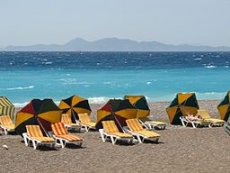New publications
What are the dangers of swimming in prohibited places?
Last reviewed: 01.07.2025

All iLive content is medically reviewed or fact checked to ensure as much factual accuracy as possible.
We have strict sourcing guidelines and only link to reputable media sites, academic research institutions and, whenever possible, medically peer reviewed studies. Note that the numbers in parentheses ([1], [2], etc.) are clickable links to these studies.
If you feel that any of our content is inaccurate, out-of-date, or otherwise questionable, please select it and press Ctrl + Enter.

It is always nice to take a dip in cool water on a summer day and escape the heat. However, people often forget about safety precautions and swim in places not intended for this purpose. The water of a pond or lake that seems clean at first glance and is not regularly sampled by special sanitary services may turn out to be a breeding ground for serious diseases. What are the risks of swimming in questionable bodies of water?
The pond is home to a variety of living organisms that can cause various diseases. For example, if a person has cuts or scratches, the risk of contracting leptospirosis increases. Its first symptoms include vomiting, diarrhea, severe headache, muscle pain, fatigue. If they appear, you should immediately go to the hospital. As a rule, antibiotics are prescribed for treatment. There is also a risk of contracting cryptosporidiosis, an E. coli that is usually associated with food poisoning.
Enterovirus infection and helminthic diseases can be transmitted through contaminated water. There are cases of hepatitis A, which can be avoided if you do not accidentally swallow water, but this is very difficult, especially if there are children in the water.
In summer, the most common danger that awaits those who like to splash around in prohibited bodies of water is "swimmer's itch" (cercariosis). Typical symptoms of the disease include itching and red blisters on the skin (several hours after swimming). If such symptoms appear, it is necessary to use an ointment that relieves itching, for example, with diphenhydramine or menthol. If the itching intensifies, you can take an antihistamine, and if the temperature rises and breathing becomes difficult, you should immediately consult a doctor. As experts explain, the causative agents of this disease are the larvae of duck worms found in the water. So it is better to refrain from swimming in a body of water where ducks swim. "Swimmer's itch" is an unpleasant disease that requires long-term treatment. Especially if the larvae managed to penetrate the blood and then the lungs (more often occurs in children).
According to doctors, swimmers in such bodies of water are also at risk of streptococcal and staphylococcal infections, inflammatory diseases of the genitals (vaginosis, colpitis, cervicitis), cystitis, and eczema.
Before jumping into the water, it is worth finding out whether the reservoir is suitable for swimming, look around and assess the area so as not to endanger your life and health. According to epidemiologists, today 9 recreation areas fully comply with safety standards: Levoberezhny Beach, Beach Club Complex, Beloye Lake, Meshcherskoye, Serebryany Bor-2, Serebryany Bor-3, Shkolnoye Lake, Chernoye Lake and Bolshoy Gorodskoy Pond.
